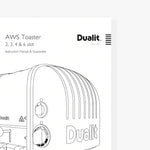Dualit Code of Conduct
Purpose
The Dualit Ltd Code of Conduct defines the standards that we expect ourselves and our Suppliers to respect and adhere in order to ensure human rights and the environment are respected at Dualit and within our supply chain. The document is based on our continued commitment to international standards such as;
- The UN Guiding Principles on Business and Human Rights.
- The Ethical Trading Initiative
- The International Labour Organisation Declaration on Fundamental Principles and Rights at work.
- The OECD Guidelines for Responsible Business Conduct
We also expect to meeting our obligations under the modern slavery act
Modern slavery is a crime resulting in an abhorrent abuse of human rights. The modern Slavery Act 2015 is intended to address the offences of slavery, servitude and forced or compulsory labour and human trafficking
For the purposes of this policy modern slavery relates to:
- Slavery – The status or condition of a person over whom any or all of the powers attaching to the right of ownerships are exercised.
- Forced Labour – Employed against a persons will.
- Human trafficking – Where a person arranges or facilitates the travel of another person with a view to them being exploited.
Provisions of the Code
1. Employment is freely chosen
There is no forced, bonded or involuntary prison labour. Workers are not required to lodge ‘deposits’ or their identity papers with their employer and are free to leave their employer after reasonable notice.
2. Freedom of association and the right to collective bargaining are respected
Workers, without distinction, have the right to join or form trade unions of their own choosing and to bargain collectively.
The employer adopts an open attitude towards the activities of trade union and their organisational activities. Worker’s representatives are not discriminated against and have access to carry out their representative functions in the workplace. Where the right to freedom of association and collective bargaining is restricted under law, the employer facilitates, and does not hinder, the development of parallel means for independent and free association and bargaining.
3. Health & Safety
A safe and hygienic working environment shall be provided, bearing in mind the prevailing knowledge of the industry and of any specific hazards. Adequate steps shall be taken to prevent accidents and injury to health arising out of associated with, or occurring in the course of work, by minimising, so far as is reasonably practicable, the cause of hazards inherent in the working environment.
Workers shall receive regular and recorded health & safety training, and such training shall be repeated for new or reassigned workers.
Access to clean toilet facilities and to drinkable water, and if appropriate sanitary facilities for food storage shall be provided.
Accommodation where provided shall be clean, safe, and meet the basic needs of the workers.
The company observing the code shall assign responsibility for health & safety to a senior management representative.
4. Child labour shall not be used
The ETI state that a child is any person under than 15 years of age, unless local minimum age law stipulates a higher age for work or mandatory schooling, in which case the higher age shall apply. If however, local minimum age law is set at 14 years of age in accordance with developing country exceptions under ILO Convention No. 138 the lower will apply.
There shall be no new recruitment of child labour. Companies shall develop or participate in and contribute to policies and programmes, which provide for the transition of any child found to be performing child labour to enable her/him to attend and remain in quality education until no longer a child.
Children and young persons under 18 shall not be employed at night or in hazardous conditions. These policies and procedures shall conform to the provisions of the relevant ILO standards.
5. Wages
Wages and benefits paid for a standard working week meet, at a minimum, national legal standards, or industry benchmark standards, whichever is higher. In any event wages should always be enough to meet basic needs and to provide some discretionary income.
All workers shall be provided with written and understandable information about their employment conditions in respect to wages before they enter employment and about the particulars of their wages for the pay period concerned each time that they are paid.
Deductions from wages as a disciplinary measure shall not be permitted nor shall any deductions from wages not provided for by national law be permitted without the expressed permission of the worker concerned. All disciplinary measures should be recorded.
6. Working hours are not excessive
Dualit and it’s Suppliers will ensure that it’s employees work in compliance with all applicable laws and mandatory industry standards pertaining to regular working hours, and overtime hours, including for breaks , rest periods, holidays and maternity and paternity leaves. Working hours, excluding overtime, shall be defined by contract.
All overtime shall be voluntary. Overtime shall be used responsibly, considering all the following: the extent, frequency and hours worked by individual workers and the workforce. It shall not be used to replace regular employment. Overtime shall always be compensated at a premium rate.
The total hours worked in any 7-day period shall not exceed 60 hours, except only in exceptional circumstances where all of the following are met:
- This is allowed by national law.
- This is allowed by a collective agreement freely negotiated with a workers organisation representing a significant portion of the workforce.
- Appropriate safeguards are taken to protect the workers health & safety
- The employer can demonstrate that exceptional circumstances apply such as unexpected production peaks, accidents, or emergencies.
Workers shall be provided with at least one day off in every 7-day period or, where allowed by national law, 2 days off in every 14-day period.
7. No discrimination is practiced & grievance system in place.
There is no discrimination in hiring, compensation, access to training, promotion, termination, or retirement based on race, caste, national origin, religion, age, disability, gender, marital, status, sexual orientation, union membership or political affiliation.
Procedures must be that enable workers to raise any grievances that they have and to have access to a fair hearing and remedy when the grievance is upheld. A grievance committee with decision making power, that is impartial, accessible and gender sensitive, should be in place.
8. Regular employment is provided
To every extent possible work performed must be based on recognised employment relationships established through national law and practice.
Obligations to employees under labour or social security laws and regulations arsing from the regular employment relationship shall not be avoided through the use of labour only contracting, subcontracting or home working arrangements or through apprenticeship schemes where this is no real intent to impart skills or provide regular employment, nor shall any such obligations be avoided through the excessive use of fixed term contracts of employment.
9. No harsh or inhumane treatment is allowed
Physical abuse or discipline, the threat of physical abuse, sexual or other harassment and verbal abuse or other forms of intimidation is prohibited.
10. Grievance
Dualit and our Suppliers will have a grievance mechanism in place that enables individuals, workers, companies, including whistle blowers to raise their grievances. A grievance committee with decision making power, that is impartial, accessible and gender sensitive, should be in place to continuously monitor the grievance mechanism, keep records on the issues raised and take appropriate actions in a confidential manner.
11. Traceability & Record Keeping
Dualit and our Suppliers will have a system in place to ensure the traceability and accounting of certified and conventional volumes. There should be transparent and up to date records to demonstrate compliance with this.
12. Environment
Dualit and our Suppliers will comply with all applicable legal environmental requirements and to demonstrate continual improvement of its environmental performance. Dualit and our Supplier will ensure they obtains, keeps current and follows the reporting guidelines of all the required environmental permits and registrations. This will cover all aspects of environmental protection including (as appropriate) such issues as energy management, pollution prevention, deforestation, biodiversity, waste and water management
13. Anti-Bribery & Corruption
Dualit and our Suppliers will conduct business in an honest and ethical manner. As part of that, there will be a zero-tolerance approach to bribery and corruption and a commitment to acting professionally, fairly and with integrity in all business dealings and relationships, wherever it operates, and implementing and enforcing effective systems to counter bribery.
14. Continuous Improvement
We recognise that meeting our Standards is a dynamic process and non-compliance may not necessarily lead to disengagement. Instead we encourage our Suppliers to work towards continuously improving their systems and we will support our Suppliers in their efforts to do so. By doing so we will ensure that we have prevented any potential negative impacts to our aim of respecting human rights and the environment in our supply chain and our own operations.
Anti-Corruption and Bribery Policy
Policy statement
It is the policy of Dualit Ltd (the Company) to conduct business in an honest and ethical manner. As part of that, the Company takes a zero-tolerance approach to bribery and corruption and is committed to acting professionally, fairly and with integrity in all its business dealings and relationships, wherever it operates, and implementing and enforcing effective systems to counter bribery.
Purpose
The Company will uphold all laws relevant to countering bribery and corruption in all the jurisdictions in which it conducts business, including, in the UK, the Bribery Act 2010 (the Act), which applies to conduct both in the UK and abroad.
Scope and applicability
- This policy applies to all individuals working for or on behalf of the Company at all levels and grades, whether permanent, fixed-term or temporary, and wherever located, including consultants, contractors, seconded staff, casual staff, agency staff, volunteers, agents, sponsors and any other person who performs services for or on behalf of the Company, (collectively referred to as Workers in this policy).
- In this policy, Third Party means any individual or organisation that Workers come into contact with during the course of work and the running of the Company’s business, and includes actual and potential clients, intermediaries, referrers of work, suppliers, distributors, business contacts, agents, advisers, government and public bodies (including their advisers, representatives and officials), politicians and political parties.
What is bribery?
- A bribe is an inducement or reward offered, promised or provided in order to improperly gain any commercial, contractual, regulatory or personal advantage, which may constitute an offence under the Act, namely:
- giving or offering a bribe;
- receiving or requesting a bribe; or
- bribing a foreign public official.
- The Company may also be liable under the Act if it fails to prevent bribery by an associated person (including but not limited to Workers) for the Company’s benefit.
Gifts and hospitality
- This policy does not prohibit normal and appropriate gifts and hospitality (given and received) to or from Third Parties unless otherwise specifically stated, subject to the principles set out below (the Overriding Principles), namely that any gift or hospitality:
- must not be made with the intention of improperly influencing a Third Party or Worker to obtain or retain business or a business advantage, or to reward the provision or retention of business or a business advantage, or in explicit or implicit exchange for favours or benefits;
- must comply with local law in all relevant countries;
- must be given in the name of the organisation, not in an individual’s name;
- must not include cash or a cash equivalent;
- must be appropriate in the circumstances;
- must be of an appropriate type and value and given at an appropriate time taking into account the reason for the gift;
- must be given openly, not secretly; and
- in the case of gifts, they must not be offered to, or accepted from, government officials or representatives, politicians or political parties,
- The Company appreciates that the practice of giving business gifts varies between countries and regions and what may be normal and acceptable in one region may not be in another. The test to be applied is whether in all the circumstances the gift or hospitality is reasonable and justifiable both in the UK and any other relevant country. The intention behind the gift should always be considered.
What is not acceptable?
- It is not acceptable for any Worker (or someone on their behalf) to:
- give, promise to give, or offer, a payment, gift or hospitality with the expectation or hope that they or the Company will improperly be given a business advantage, or as a reward for a business advantage already improperly given;
- give, promise to give, or offer, a payment, gift or hospitality to a government official, agent or representative to facilitate or expedite a routine procedure;
- accept payment from a Third Party where it is known or suspected that it is offered or given with the expectation that the Third Party will improperly obtain a business advantage;
- accept a gift or hospitality from a Third Party where it is known or suspected that it is offered or provided with an expectation that a business advantage will be improperly provided by the Company in return;
- threaten or retaliate against another Worker who has refused to commit a bribery offence or who has raised concerns under this policy; or
- engage in any activity that might lead to a breach of this policy.
Facilitation payments and kickbacks
We do not make, and will not accept, facilitation payments or “kickbacks” of any kind, such as small, unofficial payments made to secure or expedite a routine government action by a government official, or payments made in return for a business favour or advantage.
Charitable donations and sponsorship
The Company only makes charitable donations and provides sponsorship that are legal and ethical under local laws and practices and which are in accordance with the Company’s internal policies and procedures.
Record keeping
We keep appropriate financial records and have appropriate internal controls in place which evidence the business reason for gifts, hospitality and payments made and received.
Responsibilities and raising concerns
- The prevention, detection and reporting of bribery and other forms of corruption are the responsibility of all those working for us or under our control. All Workers are required to avoid any activity that might lead to, or suggest, a breach of this policy.
- Workers are required to notify the Company as soon as possible if it is believed or suspected that a conflict with this policy has occurred, or may occur in the future, or if they are offered a bribe, are asked to make one, suspect that this may happen in the future, or believe that they are a victim of another form of unlawful activity.
- Any employee who breaches this policy may face disciplinary action, which could result in dismissal for gross misconduct. We reserve our right to terminate our contractual relationship with non-employee Workers if they breach this policy.
Training and communication
Training on this policy is provided for all Workers and our zero-tolerance approach to bribery and corruption will, where appropriate, be communicated to clients, suppliers, contractors and business partners.
Monitoring and review
- The Company monitors the effectiveness and reviews the implementation of this policy at appropriate intervals, considering its suitability, adequacy and effectiveness. Any improvements identified are made as soon as possible. Internal control systems and procedures are also subject to regular review to provide assurance that they are effective in countering any risks of bribery and corruption.
- All Workers are aware that they are responsible for the success of this policy and should ensure they use it to disclose any suspected danger or wrongdoing.











